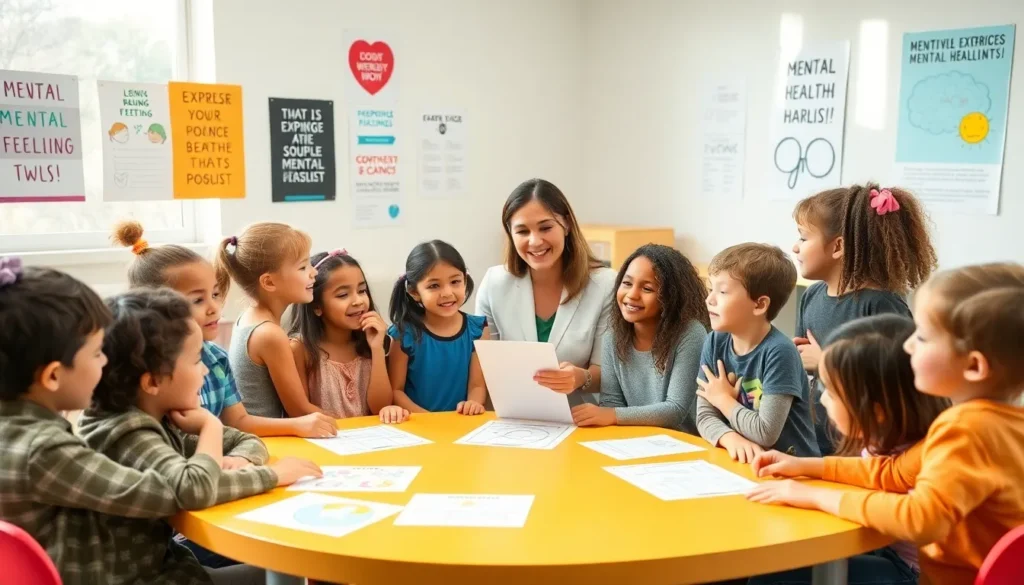In a world where kids juggle homework, soccer practice, and the occasional existential crisis, mental health games are the secret sauce to keeping their minds in tip-top shape. Who knew that playtime could also double as therapy? These games not only entertain but also equip children with essential tools to navigate their feelings, develop resilience, and maybe even learn to share their toys without a meltdown.
Imagine a game where kids can defeat stress monsters or build a fortress of calm. Sounds like a blast, right? With a mix of fun and learning, mental health games offer a unique way for kids to understand their emotions while having a good laugh. So, let’s dive into this playful realm where mental wellness meets imagination, ensuring that every child can grow up feeling like a superhero of their own story.
Table of Contents
ToggleOverview of Mental Health Games for Kids
Mental health games for kids encompass a variety of activities designed to support emotional well-being. These games actively engage children in learning coping strategies and developing resilience. Techniques like role-playing scenarios or interactive storytelling provide a platform for kids to explore their feelings safely.
These games often incorporate elements of fun while teaching essential life skills. Activities that involve teamwork, problem-solving, or creative expression encourage social interaction and communication. Engaging in such games nurtures emotional connections and strengthens relationships among peers.
Educational aspects, such as understanding emotions or recognizing triggers, are critical components of these games. For example, a game that includes identifying feelings through color-coded cards helps children articulate their emotions. Games promote mindfulness practices, allowing kids to experience the benefits of relaxation techniques in an enjoyable manner.
Incorporating technology, digital mental health games offer interactive experiences that appeal to the interests of today’s youth. Many apps provide guided meditation or relaxation exercises specifically designed for young audiences. These digital tools can reach children who may be reluctant to engage in traditional therapeutic activities.
Parental involvement in selecting and utilizing mental health games enhances their effectiveness. Parents can facilitate discussions around game experiences, helping children reflect on their feelings and learn from the scenarios encountered. Continuous communication and support create a safe environment where emotional growth can thrive.
Benefits of Mental Health Games

Mental health games offer numerous advantages for children’s emotional and social development. These games equip kids with essential skills to navigate life challenges effectively.
Emotional Resilience
Children cultivate emotional resilience through engaging gameplay. They learn to identify feelings, manage stress, and adapt to changes. Game scenarios allow exploration of coping strategies in a safe environment. Techniques such as role-playing empower kids to face fears and overcome obstacles. As they practice these skills, young players become more confident in expressing their emotions. Success in the game translates to real-life scenarios, helping kids develop a growth mindset. With repeated play, emotional regulation strengthens, making it easier to bounce back from setbacks. They grow up better prepared for challenges, enhancing their overall well-being.
Social Skills Development
Social skills development significantly improves with mental health games. Group gameplay encourages collaboration and communication among peers. Kids engage in discussions, learn to negotiate, and resolve conflicts effectively. They practice empathy through interactive storytelling, which fosters understanding of others’ perspectives. Sharing experiences in a team setting enhances relationships, promoting a sense of belonging. As they work together to achieve common goals, friendships strengthen. These games also help children navigate social cues, improving their ability to connect with others. Ultimately, enhanced social skills contribute to healthier interactions and support networks.
Types of Mental Health Games
Mental health games for kids come in various formats, each offering unique benefits. Engaging with different types can help children develop emotional skills effectively.
Digital Games
Digital games capture children’s attention through interactive storytelling and engaging visuals. Apps offering meditation and relaxation exercises provide guided support for emotional regulation. They encourage kids to explore their feelings in a safe environment. Popular choices include mindfulness apps that teach breathing techniques and video games that incorporate social-emotional learning. Many of these games allow for progress tracking, giving kids a sense of achievement. Additionally, technology facilitates varying levels of difficulty, accommodating different age groups and emotional needs.
Board Games
Board games promote face-to-face interaction while building essential emotional skills. Games like “Feelings Charades” or “The Emotions Game” encourage children to express their feelings and recognize emotions in others. Each game typically includes discussions about strategies for coping with emotional challenges, making the gameplay beneficial for mental health. Group play enhances teamwork and communication. Integrating storytelling elements increases relatability, further engaging kids in lessons about managing emotions. Such activities create opportunities for parents and children to connect, reinforcing family support.
Outdoor Activities
Outdoor activities serve as a dynamic way to foster mental health and well-being. Games like “Emotion Scavenger Hunt” or “Stress-Buster Tag” encourage physical activity along with emotional exploration. Exercise helps release endorphins, contributing to better mood management. Nature-based activities also allow kids to connect with their environment, enhancing relaxation and mindfulness. Group-based outdoor games foster collaboration and communication, critical for developing social skills. Sharing feelings during these activities strengthens friendships, making it easier for children to navigate emotions in real-world scenarios.
Popular Mental Health Games for Kids
Mental health games engage children in fun ways while teaching valuable skills. Here are two popular games that support emotional well-being.
Game 1: “Mindful Monsters”
“Mindful Monsters” introduces kids to mindfulness through engaging animated characters. Players navigate scenarios, helping monsters manage anxiety and stress with breathing techniques and positive affirmations. Interactive elements encourage children to identify their feelings while practicing coping strategies. They learn to apply these techniques in real-life situations, promoting emotional growth and resilience. By the end of the game, kids gain better awareness of their emotions and confidence in handling difficult feelings.
Game 2: “Feelings Detective”
“Feelings Detective” enables children to explore emotions in a playful environment. Players investigate various scenarios to uncover hidden feelings and triggers in their characters. Through problem-solving tasks, children practice empathy by considering different perspectives. The gameplay fosters discussions around emotions, allowing kids to articulate their feelings better. As they advance, children develop skills to communicate their emotions and navigate social interactions effectively, enriching their emotional intelligence and relationships.
Tips for Parents and Educators
Engaging kids in mental health games can be a fun way to support their emotional well-being. Encourage open conversations about feelings to foster a healthy dialogue. Incorporating games into daily routines can make emotional exploration enjoyable and relatable. Setting aside dedicated time for these activities can enhance their effectiveness.
Choosing age-appropriate games is crucial. Younger children may benefit from simpler formats, while older kids might engage better with more complex scenarios. Introducing elements of role-playing helps kids relate to characters and situations, making feelings easier to understand. Monitoring gameplay can provide insight into emotional reactions and social dynamics.
Collaborative gameplay encourages teamwork, so facilitating group interactions strengthens social skills. Observing how kids communicate and resolve conflicts during play offers valuable insights into their emotional development. Providing support during challenging moments reinforces parental involvement and allows for discussions on coping strategies.
Incorporating mindfulness practices within games enhances emotional regulation. Digital tools may offer guided exercises that teach relaxation techniques. Encouraging practice of these techniques during gameplay can help kids apply mindfulness in everyday situations. Sharing personal experiences about managing emotions can help normalize these discussions.
Reinforcing lessons learned from games in real-life scenarios aids in retention. Practicing empathy and emotional intelligence outside game settings strengthens children’s interpersonal relationships. Recognizing triggers and discussing strategies can also help them prepare for future challenges.
Building a supportive environment around mental health education benefits children’s development. Collaborating with educators can lead to a broader implementation of mental health games in schools. Creating a community focus on emotional wellness fosters resilience and support networks, ultimately contributing to children’s overall well-being.
Mental health games for kids are invaluable tools that not only entertain but also empower. By integrating play with emotional learning these games equip children with essential life skills. They foster resilience enhance social interactions and promote emotional intelligence in a fun and engaging way.
Parents and educators play a crucial role in this journey. By actively participating in these games they can facilitate meaningful discussions about feelings and coping strategies. This collaborative approach strengthens family bonds and creates a supportive environment for emotional growth.
As children navigate life’s challenges these games prepare them to express emotions manage stress and build lasting relationships. Embracing mental health games is a step towards nurturing a generation that values emotional well-being and resilience.





